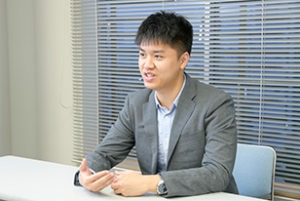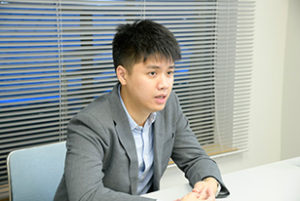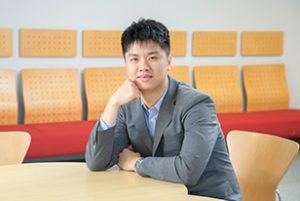Wai Yan Lin
Fujitsu Scholar on the 2018 Spring Course
Taking the Initiative for Social Innovation
Profile
Director of Marketing
Sein Gay Har
Interview
Mr. Wai Yan Lin just completed the Global Leaders for Innovation and Knowledge 2018 Spring Course and is currently working as a director in marketing at a major retailer in Myanmar. As a manager, he witnessed young college graduates without any practical work experience facing difficulty in finding employment. With his Capstone Project, a trial program at his store which provides part-time, on-the-job training and vocational internship training, Wai Yan Lin is seeking to help students gain basic practical work experience and soft skills before they graduate.
―Why did you apply to the program?
When I learned about the Global Leaders for Innovation and Knowledge program, the first two things that popped up in my mind were innovation and leadership. I think innovation is an essential element for every organization to be successful in the long run. In Myanmar, I’ve seen companies that were successful in the past but could not sufficiently innovate to catch up with modern trends and the development of the country. Some gradually fell behind the competition and eventually ceased to even exist in the business environment. I also feel that an organization must be led by someone who has a global vision. That is what I am hoping to achieve in the long run when I return to my organization.
―What insight did you gain from the program?
First, I think I could see the importance of having a more collectivist spirit instead of being individualistic. This program involves a great deal of activities which encourage working as a group or team rather than working individually.
At first, I thought that working individually would be faster and quicker. However, I realized that, when working with others, whatever you may sacrifice in speed during the beginning will be made up for in the end when the team members actually click. The group can combine diverse opinions to come up with more creative ideas than just one person thinking by his or herself.
Another important realization concerns trying to understand, respect, and appreciate other cultures. We studied at four different places with a variety of people from different countries during this module. This led us to experience many cultural changes, as well as different and unique characteristics of cultures from all over the world – especially from the Asia-Pacific region. I realized that all cultures have their own unique advantage, as well as learning points for others to study. Especially since we are now living in a globally diverse and globally connected work environment, the more we can understand and appreciate about other cultures, the more successfully we will integrate with each other.
―How would you implement social innovation in Myanmar?

My country is quite similar to Thailand, and we are facing many similar social issues. I am trying to use my Capstone Project to address one of those issues, which is that many university students lack practical experience during the university study period. Most of them are focused too much on studies and not on engaging in practical, real-life experience.
This means that they encounter difficulties when they graduate and try to enter the workforce. Employers expect them to have experience, which they don’t have. Consequently, they are offered lower salaries compared to what they expect to receive. Sometimes, the job vacancies are open only to those who are experienced, so such new graduates do not have the opportunity to compete on a level playing field with experienced applicants.
My idea is to start off by taking 60 students and giving them job opportunities as part of vocational training at my retail store. This would provide them a chance to acquire business attitudes and an understanding of business ethics, as well as some very important soft skills such as communication, teamwork, customer service, and respect for each other in the working environment. I know that it will not be easy – as I will have to seek the assistance of other stakeholders and even utilize skill trainers – but, nevertheless, that is one example of a project I would like to pursue in the near future when I return to Myanmar.
―How would you apply your observations from the Doi Tung Development Project?
Firstly, one of the lessons I can take from the Doi Tung Development Project and apply towards my country is having a strong commitment. If you want to do something good for society, you have to stick to what you believe – even when you face challenges and problems or difficulties.
Furthermore, systematic planning and a long-term approach are critical, rather than simply trying to solve a short-term crisis. As we observed in the Doi Tung project, the organizers made careful plans for five, 10, 20, and even 30 years. That kind of systematic, long-term mindset is really essential in the development of my country, as I feel that many people in Myanmar are too focused on short-term results or short-term solutions rather than a truly long-term approach.
Another point I learned is the importance of trying to find the root causes rather than the symptoms of any situation. In the case of Doi Tung, before the project started, many programs tried to focus too much on solving the symptoms of the crisis rather than the root cause. Ultimately, they were not successful. But, when the foundation came in, they tried to find the root cause of the area’s crisis. That really transformed the whole area into a very successful and sustainable society.
I would like to adopt that spirit and then try to nurture it, at least starting from my organization and then slowly towards all members of my country’s society as well.
―Did your assessment change after the program?

Before attending the Global Leaders for Innovation and Knowledge program, I thought that, perhaps, the root cause of unemployment was that companies didn’t want to take risk by hiring a new generation of leaders. I thought that, at least in my organization, I could encourage the upper management to hire those students. However, I found out that risk aversion is not the root cause. The reason why new graduates are not easily hired is because the students are not mature enough. They simply don’t have enough work experience when they are ready to start their career.
We learned during the program that, if we want to find the root cause, we might have to ask the question “Why?” about five times! In the concept creation class, we discussed how the root cause sometimes doesn’t emerge with the first why or second why. Sometimes, it is only after you have asked about five times – and gone progressively deeper – that you will find out the root cause.
―How has your impression of leadership styles changed?
Before attending the program, I would say that my leadership style was primarily democratic. But now, having completed the program and learned about the many facets of leadership, I realized that there is no perfect leadership style. Rather than having only one style, you have to look at the context of the situation and the scenarios that you’re facing. On some occasions, perhaps a democratic approach should be applied. At other times, a transactional style of leadership might be more appropriate.
―What is the difference between a good leader and a great leader? Did the site visits to Singapore and Doi Tung inspire you?
I believe that what differentiates a good leader and a great leader is trying to see other people’s perspectives. Sometimes you may think that you have the best opinion, but if you try to view an issue from other people’s perspectives – including how other people feel and think – you can become self-aware that the concerns of others might impact your decision-making, as well as your chances of achieving the best results and outcome for the society.
Also, sometimes leadership is not all about being good by yourself. It’s more about the teamwork, the team basis. Sometimes you need to let your team members or your followers act on your behalf. If you only act on your own, it could have a negative impact on the confidence and the morale of your team members while also increasing your own selfishness. Conversely, when you do delegate, your team members will feel more confident and inspired.
My experience in this program showed me that you can really get the best out of your team members by trying to delegate more authority and trying to share responsibility while acting as a facilitator. This was very apparent to me in the case of Singapore. It was very clear to me that, although Lee Kuan Yew was a person of strong leadership, Singapore would not be as successful as it is today if he had not let his followers continue his job.
―Are there other ways what you’ve learned can help your nation?
Yes, there are. I was quite impressed by the Doi Tung Development Project. This project succeeded in the reforestation of certain parts of Thailand, and I would like to reforest some areas of my country as well. Of course, such a project is much bigger in scope, so I still have to study and learn about this much more.
I was also interested in the concept of a sustainable lifestyle, as is being practiced at Doi Tung. Often times, people are focused too much on self-development and self-consumption rather than trying to care about how our consumption affects Mother Nature. For example, I feel that people in Myanmar are using too many cars now. One middle-income family may have as many as five cars!
Instead of using so many cars, I would like to educate or convince them to try and pool their cars so that there will be less traffic on the roads. Traffic jams are becoming a very big problem in my country. We have to spend hours commuting during the rush hour. That kind of basic knowledge about carpooling is something I would like to share with my society through a public campaign.
―Please tell us about your future goals.

Someday, I would like to help with development for kids or even teenagers who are left out of school. There are many in Myanmar who cannot continue their studies because of financial difficulties. For example, they may have to drop out of school after attending for six, seven, or sometimes only five years. Or, perhaps, even after they manage to finish high school, they have to drop out of university because they cannot support themselves or their parents and families.
I have seen many students in these situations. I would like to help them continue their studies while also being able to provide enough income and financial stability for their families and parents. Here, as well, recruiting them at our organization would help them acquire work experience while allowing them to support their parents or save expenses and income for further education.



